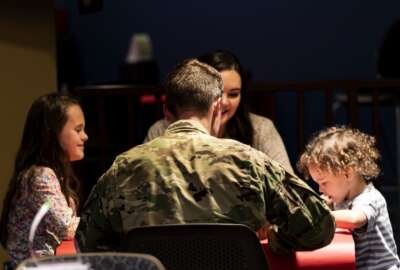The Defense Department says military installations in a large swath of states are eligible to begin loosening moving restrictions due to coronavirus as part of the military’s conditions-based phased approach to reopening.
A total of 39 states — including Washington D.C. — and five host nations meet the criteria set by Defense Secretary Mark Esper on May 22. The decision to allow troops and their families to move is still under the discretion of local base commanders depending on that particular installation’s condition. The secretaries of the military departments, commanders of the combatant commands and the chief management officer will assess specific DoD installations, facilities or locations under their purview
California, Florida, Indiana, Michigan, Minnesota, Montana, Nebraska, Nevada, New Hampshire, New Jersey, North Carolina and Ohio are the states that have still not met the standards set forth by DoD.
The criteria to open up travel includes:
– Removal of shelter-in-place orders or other travel restrictions;
– 14-day downward trajectory of flu-like and COVID-19-like symptoms; and
– 14-day downward trajectory of new COVID-19 cases or positive tests.
The list of locations represents the first time since mid-March that bases in a large contingency of the United States can at least consider allowing troops to move to their next orders without waivers.
Easing travel restrictions is part of a larger plan put forth by the Pentagon to bring military installations and troop movements to a “new normal,” as coronavirus still presents a threat for the nation and to military readiness.
The military was supposed to have a stop-move order in effect until June 30; however, it was replaced by the new guidance for the phased-reopening in late May. More than 100,000 service members already had their moving plans impacted by the original stop-move order.
DoD has similar restrictions in place for opening its bases. Shortly before the stop-move order was lifted, Esper gave local commanders instructions on lowering their health protection statuses. Health protection statuses dictate the measures bases are taking against biological agents.
“These decisions must be informed by local conditions based on public health surveillance; guidance from the Centers for Disease Control and Prevention; collaboration with state, territorial and local authorities and advice from the command public health emergency officer and local military medical treatment facilities,” Esper stated in the memo.
Like the moving restrictions, commanders must ensure that there is a downward trajectory of reported cases of flu-like and COVID-like illnesses for at least 14 days. The same goes for patients who test positive for COVID-19. Commanders must also show that medical treatment facilities or local hospitals have the capacity to treat all patients without situational standards of care. The medical facilities must also have an adequate diagnostic COVID-19 testing program in place for at-risk healthcare workers and those exhibiting symptoms of coronavirus.
As of June 5, more than 10,000 DoD-related people have been infected with coronavirus. That includes active duty military, civilian employees, military dependents and contractors.
Copyright
© 2024 Federal News Network. All rights reserved. This website is not intended for users located within the European Economic Area.
